
Mongolian New Year’s Day
N 51°33'336'' E 099°15'341''
Day: 212
Sunrise:
08:26
Sunset:
18:47
Total kilometers:
1281
Soil condition:
Ice, snow
Temperature – Day (maximum):
minus 5°C
Temperature – day (minimum):
minus 15°C
Temperature – Night:
minus 29°C
Latitude:
51°33’336”
Longitude:
099°15’341”
Maximum height:
1981 m above sea level
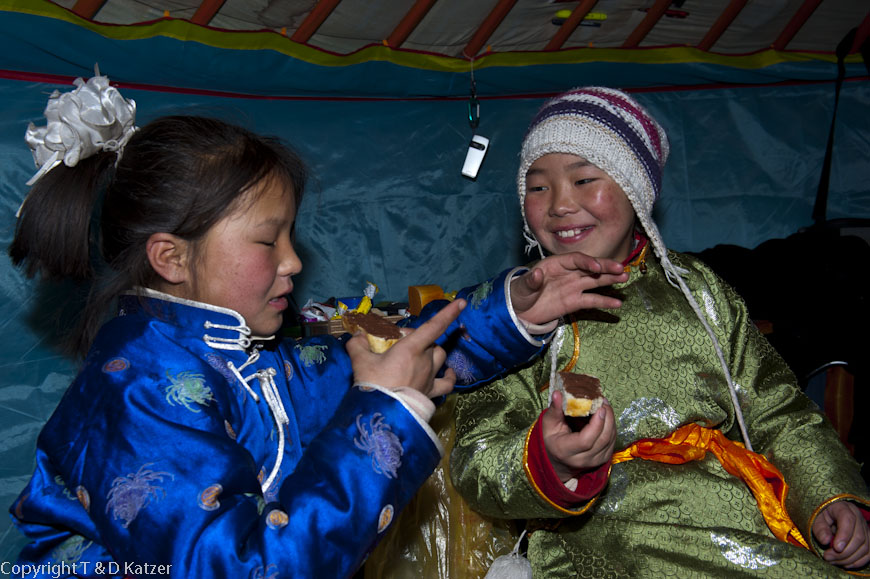
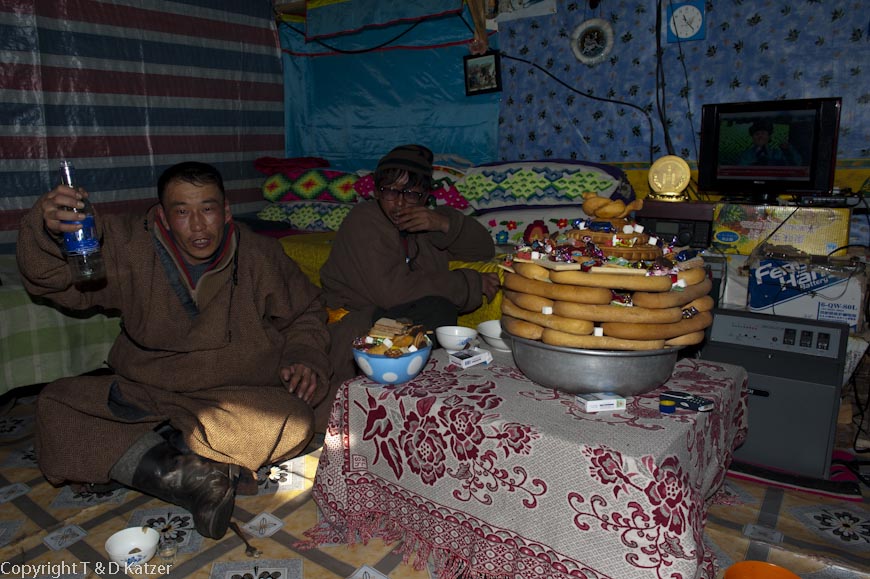
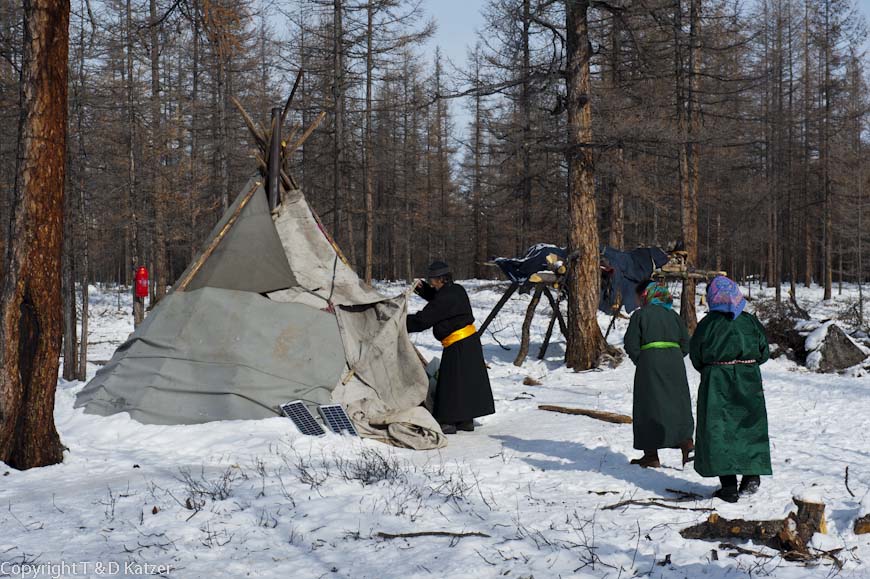
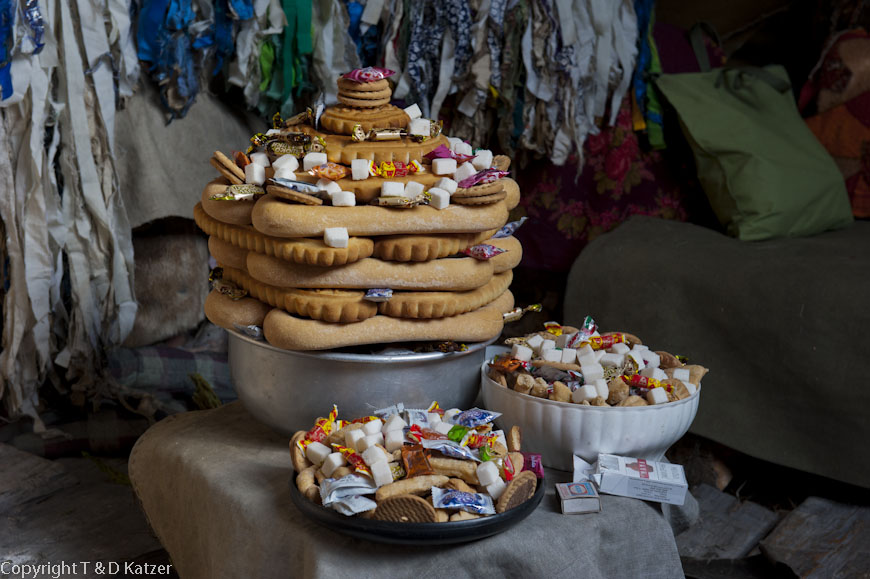
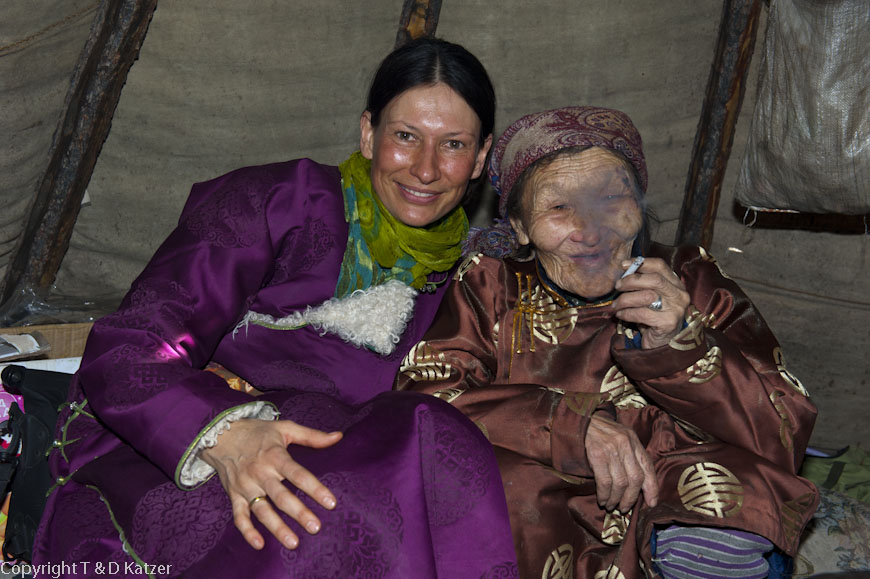

The night passed without further incident and this morning is quiet. It is 8:26 a.m. when I leave our yurt and welcome New Year’s Day with open arms, as is the Mongolian custom. I stand in front of our yurt, turn my face to the east and stretch my arms towards the rising sun. I wish us good health and a happy journey. As Tsaya and Ultsan are still in Tsagaan Nuur, it is quiet outside their log cabin. But I don’t see any Tuwa greeting New Year’s Day in front of Gamba’s log cabin and some tepees either. They’re probably sleeping it off, I think to myself, fetching firewood from the woodpile as I do every morning and retreating back to our dwelling.
During breakfast we ask ourselves whether we should visit the Tuwa families. “As the custom dictates that every guest must be presented with a gift, I don’t feel comfortable at the thought of suddenly appearing in their tipi,” says Tanja. “Hm, I think people would take it more as an insult if we didn’t show them appreciation on such an important day. We can only show that with a visit. Anything else would be a mistake,” I ponder. “You’re probably right,” says Tanja hesitantly. “Apart from that, Tsaya has told us to give the host a banknote. That makes up for the gift. And if the people pay us a return visit afterwards, they will receive a gift from us. So the balance has been struck in any case. So no problem.” “You’ve convinced me. Who should we visit first? Gamba?” “Exactly. He’s one of the oldest men in the camp,” I reply. No sooner have we decided to visit our campmates than two young girls dressed in feestagsdeel barge into our yurt. “Sain bajtsgaana uu!” (“Good day”), they greet us giggling happily and sit down on the little folding stools. “Would you like a sandwich with nougat cream?” asks Tanja, who has already prepared a plate full for any visitors. “Oh yes!” the two cackle. “Here’s another cup of milk tea,” says Tanja, carefully handing the girls a bowl each. “Hi, hi, hi,” they reply cheekily, taking a sip and biting into the delicious bread. Before the excited girls have eaten their bread, Tanja gives them each a beautiful hair clip. Then they storm out of the yurt, still laughing. As soon as the door crashes into the wooden frame, six-year-old Erkhenbayar falls into our home. He greets us politely according to the festive custom by grasping my arms with his palms facing upwards. He also gets a delicious nougat cream sandwich, a bowl of milk tea and a little comic figure.
Shortly after 12:00 noon, we stand in front of Gamba’s log cabin and make ourselves heard with a shout. Then we open the door and step into the hut. “Ah, good to see you!” Purvee calls out and invites us to take a seat with a friendly laugh. Before we comply with their request, we greet Gamba by handing him a banknote. According to the zolgokh (greeting formula), we wish him happiness, health and a long life in prosperity and contentment. Pleased with our wishes, which are similar to our New Year’s wishes, he stretches out his arms. Although I am a few months older than Gamba, I reach under his arms with my palms facing upwards to support him. I lean forward to kiss him and, in keeping with custom, smell his right cheek and then his left. Gamba, meanwhile, sniffs my cheeks. The ritual is then complete. Now I’m off to Purvee to repeat them all. “Come here. I want to congratulate you too,” roars Nyam Dalai, who is crouching on the floor, battered. He staggers upwards like a bowling pin, reaches under my arms with his palms facing upwards and sniffs my cheeks. His breath smells of vodka and the greeting feels more like he’s licked my cheek with his wet tongue. “Come and have a drink with me,” he slurs and hands me a small cup. Since a refusal is tantamount to a serious insult, I pour the cheap booze burning in my gullet into my mouth and move on to greet Tso in the usual manner. He too has already dipped his liver in pure alcohol at this hour. The otherwise shy man laughs exuberantly and also hands me the small drinking vessel. I take a sip and give it back, thanking him. Tanja is also asked to drink. She puts the glass to her lips, pretends to swallow and hands it back almost as full. As she is a woman, her gesture is accepted sympathetically.
“Have a seat,” Purvee asks us again. We reply “Bairlalaa” (“Thank you”) and settle down on a wooden plank bed. Purvee moves a small schematic table in front of us and places a large thermos flask filled with salted milk tea on it. Plus a pot of sweets, all kinds of cookies and sugar cubes. As soon as we have poured ourselves a cup of tea with the sour-tasting reindeer milk that takes some getting used to, she offers us a cigarette. Although we are non-smokers, we reach for it and put the clip behind our ear. It would be rude to refuse. “Amttaj”, (“tasty”) we praise the tea and the pastries. Just a minute later, our hostess prepares another pot of freshly cooked buuz (dumplings filled with minced meat) on our little table. We understand “Ide, ide” (“eat, eat”). Among the Mongolians and the Tuwa, having your belly filled to the brim is a guarantee for a happy life in the new year. It is also of fundamental importance for them to be able to offer every guest as much as possible. This should bring prosperity, health and wealth. But not only gluttony to the point of vomiting is the order of the day, but also excessive consumption of vodka. So we sit there and devour one buuz after another, cheered on by Purvee, while Gamba keeps the vodka flowing. The TV I repaired is playing in the background. Mongolian singers do their best to dress the day in a festive robe. “Come take a photo of me!” Nyam Dalai shouts, grabs the vodka bottle and tries to stagger into position. “He won’t live to see tonight,” says Tanja. Nyam Dalai manages to assume an upright sitting position, grins happily into the camera and plunges another cup behind his gills. Then he collapses again.
Purvee really went the extra mile to prepare the log cabin for the celebration. She started washing all the blankets and covers days ago. A time-consuming process, as the water first has to be melted from the collected snow. All the cushions are neatly stacked on the wooden planks. She has draped a flower-patterned tablecloth over the low main table in front of the TV. The seven-storey New Year’s bread tower, decorated with sweets and sugar cubes, rises into the air – a must-have for every household. Comparable perhaps to our Christmas tree. “This is for you Denis,” Purvee says, handing me a cheap Chinese scented water. “Oh, thank you so much,” I say happily, while Tanja receives a pair of children’s socks as a gift. “As custom demands, we will now visit our closest relatives. Will you accompany us?” asks Purvee. “Of course,” we reply happily, as we avoid the risk of making a behavioral error.
At 13:00 we walk to Buyantogtoh’s tipi number six. The shaman’s sister also welcomes us happily. Gamba, Purvee, her son Sansar, Tso, Saintsetseg and we greet them as custom dictates. Each of the visitors hands the hostess a banknote. Mostly between 500 and 1,000 tugrik (€0.28 and €0.57). Then Buyantogtoh offers us a place on the wooden planks laid close to the floor, which serve as sleeping places. As soon as we sit down, the hostess passes around a bowl of cookies and other sweets such as candy and sugar cubes. Although we are already full, we politely help ourselves. With a kind of incense that the Tuwa find in the taiga, the shaman blesses the area that is destined for the spirits and gods. He waves the smoking, fragrant shrub in front of a large bundle full of white, blue and green strips of cloth. These hang from a cord suspended between four thin tree trunks that serve as tent poles. The low table on which the New Year’s bread is piled up stands directly in front of the place of the gods and spirits. As with Purvee, the festive table is set with cookies, sweets and boortsog (balls of dough fried in oil) as well as New Year’s bread.
While the guests chat animatedly, drink milk tea and eat sugar cubes and cookies, Buyantogtoh fetches frozen buuz from the high stand next to the tepee. She places a metal cup in her wok, half-filled with water, and places a round tray with holes in it on top. She then prepares the buuz and lifts the wok into the hole in the oven plate. As the water begins to boil, the buuz are cooked by the rising steam. The dumplings are ready after 20 minutes. The shaman’s sister now takes the bulbous pan off the hob, closes the oven hole with the cover plate and places the festive buuz in a bowl. She immediately passes her delicacies around. Everyone digs in as if they hadn’t eaten anything before. The guests have quickly closed the remaining spaces in their bellies when a bottle of vodka is opened. Gamba blesses them by tapping his right ring finger in the high-proof alcohol, as he always does when a bottle is decapitated, and then flicking it in all four directions. Now that the nature spirits have had their share again, he hands me the little glass. “Hubaaa”, he asks me to pour the stuff into myself. “If I keep drinking so much, I won’t be able to visit your other relatives,” I try to get out of the affair. “Never mind. Today is Tsagaan Saar. You have to drink. At least one more,” he laughs and asks me to empty the cup again. Forced to do so, I pour the awful brew down my throat. “That’s it,” he laughs, filling the snifter again and passing it on to Saintsetseg, who is sitting next to me. It doesn’t take long until the bottle is empty. I breathe a sigh of relief as another one is blessed by Gamba. “I can’t do that,” I say to Tanja, who usually gets away with sipping. “I don’t know why they chose to focus on you,” she replies. “I do. They want to test my drinking strength and see how I start to stagger and stagger,’ I reply meekly as I’m handed another glass. Just 20 minutes later, we – eight people in total – had emptied our second bottle of vodka.
Before we leave, the hostess hands everyone present the obligatory gift. Tanja and I each get a bar of soap. The family members usually receive a T-shirt. As is polite, they thank you by pressing the gift to their forehead. Then they let it disappear into their deel above the belt. After all the buuz have been eaten and the vodka consumed, we walk on to visit the tribal elders in tipi five. But first Buyantogtoh ties her dog to a tree trunk. All of the camp’s dogs must be tethered on this high holiday, otherwise they would enter the tipis to feast on the New Year storms and buuz.
Puntsel came from Tsagaan Nuur especially for the festival a few days ago and now lives alone in her small tent. The 77-year-old welcomes us in an exuberant mood. “Come in! Come in!” she calls and offers us a seat on the low wooden planks in the small tent. “How are we all supposed to fit in there?” I ask. Tanja shrugs her shoulders. “There’s still room here! Come here Denis! Sit next to me!” Gamba calls out. “Oh no,” I whisper inaudibly, knowing why he wants me next to him. I settle down among the people like a poor sausage. As the wooden boards slope backwards, I have great difficulty sitting upright. After just a few minutes, this position starts to hurt my back. Moving is almost hopeless. I clutch my knees convulsively with my arms so that I can sit more or less straight. Puntsel hands out the obligatory cookies and milk tea. Tanja has the best seat in the house. She sits next to the hostess. In the place of honor opposite me, so to speak. As soon as the cookies have been passed around, which of course everyone eats as if they haven’t had anything all day, she hands us cigarettes. We take another one and put it behind our ears again, while the others begin to smoke vigorously.
Here too, the shaman blesses the sacred corner of the spirits with incense, causing a thick fog of smoke to billow through the small tent. Puntsel, who has obviously been entertaining other guests before us and is therefore already a little tipsy, puts the buuz on the stove. So that they cook quickly, she shoves a few logs of wood into the voracious little oil. The heat that the thing now throws off can give a sauna serious competition. While I feel like I’m almost suffocating in this dark tent and my back is sending ever louder pain signals, the partygoers are in high spirits. The now hot Buuz are passed around in their usual form and how could it be otherwise, everyone takes them as if they were starving. “It’s unbelievable what people can eat here,” I say to Tanja. “Ha, ha, ha,” is her boisterous reply. “You’re having a good laugh on your comfortable side,” I say, because by now I feel like a sardine from which the last drop of oil is being squeezed. “Hubaaa!” it sounds next to me and the little glass goes under my nose. Dutifully, I take it, sip it and hand it back to the head pourer. “Ügüj, ügüj (No, no) . You have to drink it,” Gamba orders. “But you said earlier that I don’t need to drink so much,” I remind him kindly. “I meant you don’t need to drink so much to Tsagaan Saar. But now you have to drink to the hostess,” he explains. All eyes suddenly turn to me. Everyone wants to see if I drink to Puntsel. “Hubaaa!”, I shout and shove the devil’s stuff down my throat. It burns like fire in your throat, then hits the tightening bottom of your stomach. Those present laugh contentedly and the cup continues to circle. The old Puntsel unabashedly whistles one snifter after the other behind her throat and lets out her guttural laugh. The agile old lady has raised six children. That is quite an achievement. But what is even more extraordinary is that she has them from six different men. According to the Tuwa, Puntsel was once a very pretty woman, worked as a singer in Ulan Bator in her younger years and loved life and men. Well, she still seems to love life and who knows how she feels about men? “Aaahhh!” It escapes her throat as another stream of vodka flows through.
After the vodka bottle is empty, Gamba wraps a banknote around it and gives it back to our hostess. Since I have already observed this gesture at Buyantogtoh, I assign it to the custom. Puntsel laughs out loud as she takes the bottle and places it on the floor next to her. “Thank God,” I groan. I notice a sly twinkle in her eyes. She quickly reaches under the altar and pulls out a new bottle of vodka. There is general laughter. The head pourer takes on the important task of opening and blessing them. As always, the gods and nature spirits, who must also be drunk out of their minds by now, get their share. It doesn’t take long for the booze to make its way to me. Meanwhile, the smell of it makes my hair stand on end. “Hubaaa!”, Gamba prompts me. I take my time, put the glass to my lips and put it down again. Due to the enormous consumption of alcohol, the festival community is no longer as attentive. When I feel unobserved, I tip the stuff behind Saintsetseg’s back between two wooden planks of the sleeping area. Then I quickly put the glass to my lips and pretend I’ve tipped it down ex’s throat. “Aaaahhh!” I snort loudly, setting the container down. I receive loud applause, congratulations, congratulations and an appreciative look from the hostess. This way I manage to avoid the booze a few times. Of course, I hope that Puntsel doesn’t smell the scent of vodka wafting into the tepee from between the planks of her bed tonight. Then those present receive their gifts. This time Tanja and I receive a pair of socks. Gamba tucks his T-shirt into his deel. The others also leave their presents in their Deel.
Once the obligatory two bottles of vodka have been consumed, we all head off together to Darimaa and Ovogdorj’s tipi number three. Ovogdorj is with the reindeer during the holidays. He wants to see how the deer are doing and whether the protective fence that the men erected some time ago is still intact. We have heard that his pancreas is inflamed and that is why he can no longer drink as much. This could be the reason why he is not in camp during the festive season. So Darimaa excuses her husband’s absence.
As soon as we have settled down on the wooden plank beds covered with blankets, Suren comes into the Urtz. As she is a poor woman and has a heavy, obviously useless alcoholic for a son, she avoids the embarrassment of having to distribute presents by visiting the respective families. Listening to our instincts, we greet her according to the ritual and hand her a banknote. She returns our welcome by sniffing our cheeks and thanking us. Gamba, Puntsel, Saintsetseg, Tso and the others also welcome her in this way and hand her a banknote. Without a word being exchanged, the clan spares old Suren the torment of being considered poor. Above all, she is granted prosperity, health and happiness for this year.
As a hostess, Darimaa does not allow herself to be denied anything and entertains us according to all the rules of the ritual. Meanwhile, I’m sitting next to old Puntsel, who keeps delighting me with her hot and raucous laughter. “I drink like a man and you like a woman. Hiiii, hi, hi, hi, hi,” she laughs quite dirty. Everyone present also finds this statement extremely funny and joins in with their laughter. So as not to sit there looking stupid, I laugh along. “Hubaaaa!” comes the cry that I will never forget as the shot glass is passed into my field of vision. “Hubaaaa!”, I shout and drink it down in one go. Applause. I nod with amusement and gratitude. Then I get up, leave the tipi and spit the devil’s stuff into the snow. Where the vodka stored in my hamster cheeks hits the white, a small circular hole is created in an instant. No wonder with the 38% alcohol content. Grinning, I re-enter the Urtz and sit down in my assigned seat next to the clan elder.
“Uuuaaahhh! Where are you? Ooohhhuuuu!” suddenly there’s a roar outside the tent. “Who’s that?” asks Tanja. “Well, who is? Nyam Dalai,” I reply. Nyam Dalai is Suren’s adopted son, who has been starstruck for many days. Staggering, he tries to get his body through the small opening of the tepee. However, without success. After several attempts, he simply collapses in front of it and remains lying in the cold snow. None of the tent occupants seem to care whether someone freezes to death or not. On the contrary, the party goes on as if no one had ever collapsed in front of the door. “Hubaaa!” Gamba shouts, handing me the cup. Using my trick, in an unobserved moment, I empty the contents behind Puntel’s back between the cracks in two boards. Then I quickly bring the glass to my lips and plunge the imaginary contents down my throat. “Sain,” the shaman praises me as Nyam Dalai comes back to life. Judging by the sounds, the man seems to be straightening up with extreme effort. Then he falls against the tent. He gets up again. He finally manages to open the rough canvas of the entrance and maneuver his body through. As soon as the door closes, it collapses again. He lies on the floor with uncontrolled movements and drools to himself. “Here, have a vodka,” says Gamba and hands the glass to the semi-conscious man. I watch in amazement as he manages to pour the liquid into his mouth. Then the saliva runs out of the corners of his mouth. It doesn’t take long for the next glass of vodka to disappear down his throat as the party takes its course. I watch the person lying on the floor, whimpering, spellbound. His condition is pathetic, I would even say threatening. I’m starting to worry about his life. It is a mystery to me how a person can tolerate such enormous amounts of strong alcohol. A normal man would have been dead as a doornail long ago. When Sansar offers him another vodka, he only reacts with grunts. Then Sansar shakes him lightly on the shoulder. Nyam Dalia opens her eyes. His gaze is broken. He tries to reach for the vodka cup. However, his fine motor skills have now completely failed and he can no longer bring the cup to his mouth. The transparent contents spill onto his jacket.
Before the first bottle is empty, the obligatory second bottle is opened. Puntsel now helps to remove the contents as quickly as possible. Not without drinking heavily, of course. The fight continues until there is not a drop left in either bottle. According to my extrapolation, every man should now have at least one entire bottle of indus. The women, Tanja and I, decidedly less so. Although there is one exception here: The old Puntsel. Her liver seems to be made of steel. Somehow this fun-loving woman is out of this world. Since we visited her in her tepee, she has smoked maybe seven or eight cigarettes and, if I’m not mistaken, poured herself a bottle of the devil’s stuff. “Come on, drink Denis!” she urges me to finish the last glass. “I always let a woman go first,” I say, to which everyone laughs and she empties the contents. She looks at me with a proud, slightly transfigured expression. “I drink like a man…” “And I like a woman,” I complete her sentence. “Hi, hi, hi,” she and the entire community laugh.
Suddenly Gamba receives a text message. In the meantime, we have become accustomed to the fact that the last reindeer nomads on earth have cell phones. A sight that does not fit into the taiga, but progress, whether good or bad, has been finding its way into the remotest corners of the earth for some years now. “Bad news?” I ask, as a deep crease furrows his brow. “Tijmee Muu”, (“Yes bad”) he says. “What happened?” I ask cautiously as I spot a tear in the corner of his eye. “My best friend has died. He was a shaman and my teacher.” “Oh, I’m sorry to hear that,” I reply sympathetically. “It’s all right Denis,” he says, smiling at me a little pained. (A little later we learn that the old shaman drank himself to death during the celebrations in Tsagaan Nuur).
Stunned, I notice a movement running through Nyam Dalai’s body. Then he pulls himself up, mumbling incomprehensible words, actually stands on two legs and sways out of the tepee like a tightrope walker. Outside, I hear his footsteps crunching in the snow as he moves away. “Unbelievable what that man can take,” I mutter. Darimaa now hands gifts to each of her guests. This time Tanja and I get a deck of cards, while Gamba stuffs another T-shirt into his deel. “He’s probably done with shirts this year,” I say, leaning towards Tanja. Before we leave, Gamba praises me for my drinking strength. “Oh, thanks, but if anyone here can take a lot, it’s you,” I return the obviously well-intentioned compliment. “Oh no. I’m already swaying while you’re still walking straight,” he replies. I smile knowingly, glad not to have been discovered as the odd cup disappeared between the wooden planks and into the snow.
After we leave Darimaa’s tipi, most of them stagger back to their homes. “You are very welcome to join us tonight,” Purvee and Gamba invite us. “Bairlalaa!”, we say thank you. As soon as we are back in our yurt, Tanja sets about cooking a hearty meal of flour and some meat for Galgai and Henbe, Tsaya and Ultsan’s dogs. “On this day, please give them as much as they can eat. On Tsagaan Saar it is also important to feed the animals abundantly,” said Tsaya. The two dogs and our Mogi don’t know what hit them. They eat and eat until they almost burst.
At 8:00 p.m. there is another unpleasant roar through the camp. We now know who this voice belongs to. Nyam Dalai is still running from tipi to tipi to maintain his vodka level. “I think it’s better if we lock our door again tonight,” says Tanja. “I think so too,” I reply and push the heavy apron bar between the door handle and the frame.
At 9 p.m. we lie on the wall and enjoy the clear starry sky, which we watch through the roof of the yurt. “The Tuva’s biggest problem is vodka,” I say thoughtfully. “Looks like it,” says Tanja. “The problem is the advertising that glorifies this devilish stuff. They even use Dschingsikhan’s name as a vodka brand to sell as much of it as possible. To be honest, it’s a real mess. Added to this is the mystification of this drink. The more you tolerate, the stronger you are regarded in Mongolian society. That is pure nonsense. Because the only thing the drink causes is addiction with the resulting illness and inevitable death.
The Tuwa out here have few prospects. Just like many Mongolians in the villages. The only pastime is this cheap booze. It’s a disaster in the truest sense of the word. I don’t blame the people, but the custom, the advertising and also the government, which does nothing about it. When I think of fathers bragging to their sons about how much of this stuff they can take and then seeing these men lose all their dignity when they are lying in their own vomit, I could tear my hair out. It’s a real vicious circle. The worst thing is the fatal consequences. These people ruin their health. Their liver breaks down. Their pancreas stops functioning. They suffer from high blood pressure and many other consequences. I wish I knew what could be done about it.” “As it stands, alcoholism among the Tuwa is bad, but you mustn’t forget that they drink more than usual during the festive season. Apart from that, alcoholism is a global challenge. It’s not just to do with the Tuwa, the Mongols, the Siberians or any other people. Even in Germany, people drink a lot. There, however, people hide in their homes. Only rarely do they stagger around on the streets,” says Tanja. “Hm, you’re right. I think if you wanted to do something about it, it would be like trying to control the snow in the mountains,” I reply resignedly, looking at the stars.
We look forward to your comments!

